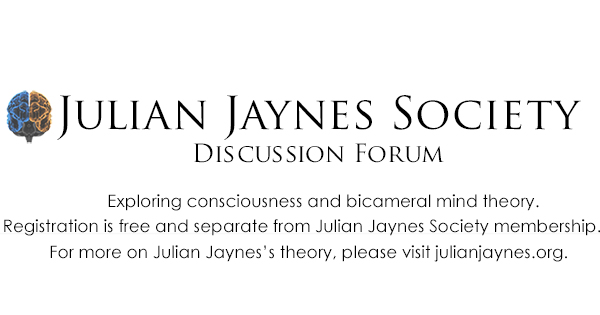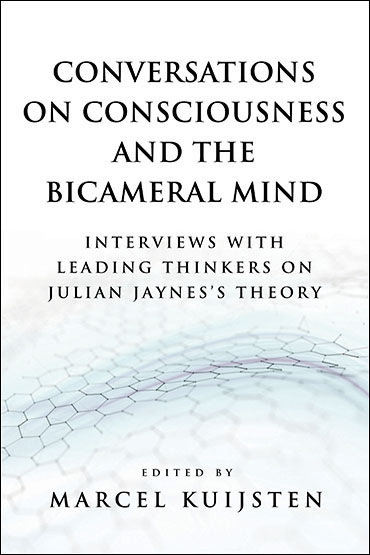I was wondering if group members would share their opinions about how best to describe the Jaynesian agenda. One of the biggest challenges many face when trying to intellectually digest Jaynes is coming to terms with his decidedly interdisciplinary approach. He integrated very different bodies of knowledge (comparative psychology, neurology, religious history, linguistics, etc.) in a manner few do. His was not a mere multidisciplinary work (tackling a problem from different angles without intermeshing ideas), but a theoretical interlinking of disparate fields, producing something genuinely novel. So if we want to label the disciplinary coherence characterizing his work, what’s the best description? I have a list of candidates and was hoping readers could throw in their two cents, letting me know your opinions. The candidates include the following.
(1) “Psychohistory.” The problem with this term is that some see it and assume it is about an individual from a psychoanalytic perspective (rather than deep changes). But at least it is in relatively common usage so some are not completely thrown off when coming across it.
(2) “Cultural-historical psychology.” This is meant to describe a discipline that explores how the psyche, configured and contextualized by culture, changes through relatively short periods, e.g., millennia or centuries (cf. evolutionary psychology, which sees changes as genetically transmitted occurring over immense time scales).
(3) “Historico-cultural psychology.” This is just a variation on # 2, but perhaps with “historico” prefixing the expression, stresses the change dimension.
(4) “Historical psychology.” This has the disadvantage of being confused with the “history of psychology,” which is an established field investigating psychology as an institutionalized scholarly field. But at least at first blush it possesses an uncomplicated sense.
(5) “Archaeopsychology.” Here “archaeo” means the exploration of layers of cultural change; it does not mean archaeology in the “stones-and-bones” sense (though certainly archaeology as usually understood can enrich a Jaynesian approach). Finally,
(6) “Archaeomentality.” This is my neologism. It is intended to indicate deeper changes in psyche than “psychological” might suggest. It has the advantage of lacking the misleading associations one might make when considering other candidates.
What Discipline Best Describes Jaynes's Approach?
Posts by anthropologist, mental health counselor, and author Brian J. McVeigh on Julian Jaynes's theory and related topics.
Return to “Brian J. McVeigh's Random Thoughts”
Jump to
- JJS Forum
- ↳ General Discussion
- ↳ News Items Related to Jaynes's Theory
- ↳ Book Discussion: The Origin of Consciousness and Julian Jaynes Society Publications
- ↳ Myths, Misconceptions, and Fact Checks About Julian Jaynes's Theory
- ↳ Brian J. McVeigh's Random Thoughts
- ↳ Julian Jaynes
- ↳ Conferences, Events, and Local Discussion Groups
- ↳ Lecture Discussion
- ↳ Interview and Q&A Discussion
- ↳ 1.0. Hypothesis One: Consciousness Based On Language
- ↳ 1.01. Hypothesis One: Consciousness Based On Language | Subtopic: Consciousness & Dreams
- ↳ 1.02. Hypothesis One: Consciousness Based On Language | Subtopic: Consciousness in Children
- ↳ 1.03. Hypothesis One: Consciousness Based On Language | Subtopic: Consciousness and AI
- ↳ 2.0. Hypothesis Two: The Bicameral Mind
- ↳ 2.1. Hypothesis Two: The Bicameral Mind | Subtopic: Auditory Hallucinations in Normal Adults
- ↳ 2.2. Hypothesis Two: The Bicameral Mind | Subtopic: Hallucinations & Imaginary Companions in Children
- ↳ 2.3. Hypothesis Two: The Bicameral Mind | Subtopic: Hypnosis, Possession & Altered States of Consciousness
- ↳ 2.4. Hypothesis Two: The Bicameral Mind | Subtopic: Religion & the Bicameral Mind
- ↳ 2.5. Hypothesis Two: The Bicameral Mind | Subtopic: Schizophrenia
- ↳ 2.6. Hypothesis Two: The Bicameral Mind | Subtopic: The Mentality of Pre-Literate & Pre-Modern Peoples
- ↳ 3.0. Hypothesis Three: Dating the Development of Consciousness
- ↳ 4.0. Hypothesis Four: Jaynes's Neurological Model for the Bicameral Mind
- ↳ The Bicameral Mind in Fiction, Film & Popular Culture
- ↳ Information for Students


